
Impact Update
Second Quarter 2024
Focusing on Nature and Human Rights
When looking at business and today’s world at large, it’s important to acknowledge that human rights and the environment are intricately connected. As part of our investment approach, we work to analyze companies to identify those across all industries that understand and address these often complex interconnected issues. This includes encouraging firms to maintain ethical supply chains that are responsible for ensuring the protection of human rights and justice, and environmental sustainability, including today’s most pressing climate change challenges.

The Domini International Opportunities Fund Investor Shares (RISEX) received ★★★★ Overall Morningstar Rating™ in the Foreign Large Growth Category as of June 30, 2024, based on its three-year rating among 383 funds. Morningstar ratings are based on risk-adjusted returns. Learn more about the Fund and methodology.
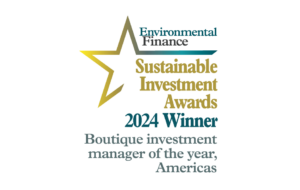
We’re also proud to be recognized as “Boutique investment manager of the year – Americas”. Read about Domini Impact Investments’ long history in the field and about what makes us different.
In this edition
Focusing on the Intersection of AI, Technology, and Human Rights
Advancing Nutrition and Sustainability with Plant-Based Products
Addressing the Surge in Child Labor in the U.S.
Kicking Off Engagements with Companies for Nature Action 100
Addressing Climate Risk and Racial Equity in Farm and Agriculture Financing
The Rise in Child Labor in the U.S. and Company Responsibility
Engagement Overview
Domini meets with company executives on its own and in collaboration with other investors to encourage stronger policies and practices on the issues that matter to us. In alignment with our standards, we seek improved disclosure, more responsible practices, and address emerging issues with our companies. Through constructive interaction – via letters, dialogues, shareholder proposals, and proxy votes – Domini communicates its expectations to companies and encourages innovation and business models that uphold respect for human rights while contributing to ecological sustainability and resilience. Read our annual engagement report at domini.com/engagement
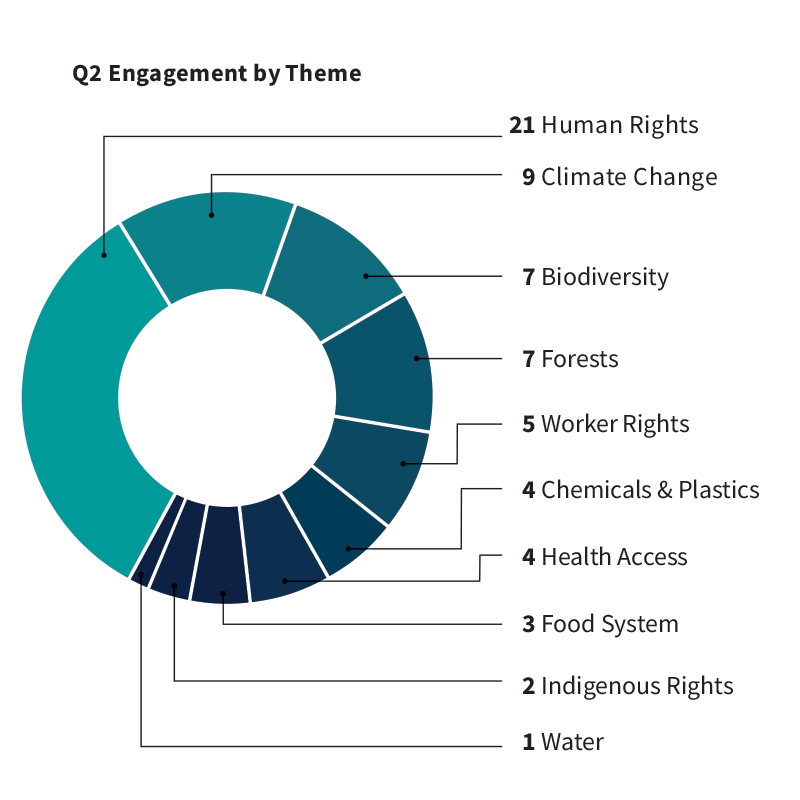
The UN Sustainable Goals (SDGs)

In the seven years since United Nations member states adopted the 2030 Agenda for Sustainable Development, the Sustainable Development Goals (SDGs) have been widely embraced by governments, civil society organizations, companies, and investors. The SDGs aim to address broad global topics such as poverty eradication, food security, protection of forests, sustainable cities and economic growth, gender equality, and climate change.
In each impact update, we’ll feature a few of our engagements alongside an investment highlight and show you which SDGs these are aligned with. Read more on the UN SDGs
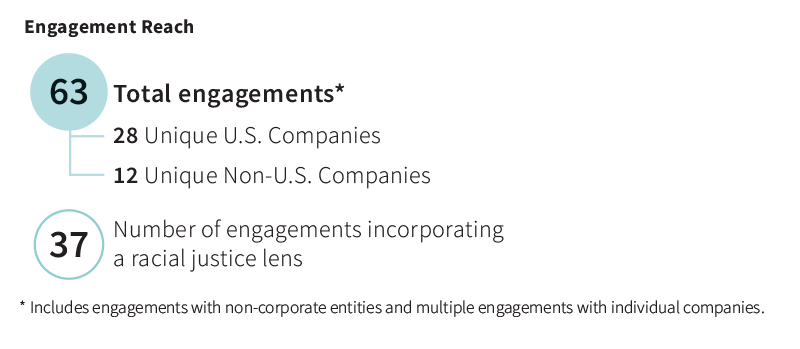
Focusing on the Intersection of AI, Technology, and Human Rights

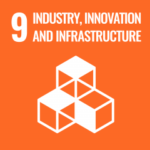

AI is taking off with increasing use cases and demand throughout the economy. Nvidia is a primary supplier of chips and super-computing technology that enables AI systems and machine learning to process large amounts of data efficiently and quickly. We’re engaging with the firm about its human rights approach, including how it is building the capacity of its team to better understand and address human rights, and deepening its evaluation of these impacts.
We are pleased to see after our recent dialogues that Nvidia is now working with an independent third-party expert to conduct a human rights impact assessment including the evaluation of the impacts its business has on stakeholders, and those linked to the end use of its products, such as technology that may be used in discriminatory ways. We recognize that as a manufacturer of general-purpose technology, it can be complicated to know where your products will end up, or to put limits on the ways they can be used, yet we appreciate that Nvidia is strengthening its staff expertise on human rights and undertaking this process to inform its human rights program and help it ensure its products are used in positive ways.
Read more at domini.com/AI
Investment Highlight: All companies mentioned are held in the Domini Impact Equity Fund and Microsoft is also in the Domini Impact Bond Fund
In 2024, a group of several large companies, including Accenture, Alphabet (Google), Cisco, IBM, Intel, and Microsoft, launched the AI-Enabled Information and Communication Technology (ICT) Workforce Consortium with the goal of re-training employees whose roles are most likely going to be impacted by AI. The Consortium members are jointly building and investing in an inclusive workforce. For example, Cisco will train 25 million people in digital skills by 2032, Intel will train over 30 million people in AI skills by 2030, and Microsoft will certify 10 million people from underserved communities for digital jobs by 2025.
Advancing Nutrition and Sustainability with Plant-Based Products

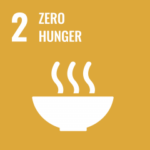
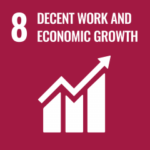
Overconsumption of animal products in the U.S. and Western countries present financial, climate, nature, animal-welfare, and public health related risks. With experts across specialties, we have stressed the importance of a dietary shift. We participated in a collaborative engagement led by FAIRR with Sainsbury’s, the British supermarket chain, and Unilever, on their role in helping to move society away from this overconsumption of animal products. These engagements focus on three areas of opportunity for each company, related to (1) how reducing animal protein can help it meet its climate goals, (2) investments and plans to change the product line to make nutritious, plant-based products available and affordable, and (3) consumer outreach and education. This work presents an opportunity to improve these companies’ food products’ nutritional value while also supporting sustainable practices. We also sought to understand each company’s strategy and how they are engaging with farmers to support a just transition.
Investment Highlight: Domini Impact International Equity Fund
Marks & Spencer, a U.K. food and household goods company, has an in-house brand, Plant Kitchen, which is suitable for vegans and offers over 200 plant-based dairy-free and meatless products. As part of a campaign targeted at making family dinners greener, it has encouraged 30 million customers to explore plant-based protein. In 2023, Plant Kitchen’s sales increased by 23% compared to 2021/2022. The company also features a “meat-free Monday” section on its website providing vegan recipes.
Addressing the Surge in Child Labor in the U.S.



Recent media reporting has drawn attention to the increase of child labor violations in the U.S., with children working jobs in violation of U.S. labor laws, while at the same time some states are weakening child labor protections. We recently wrote to twelve companies identified in the media as having alleged illegal child labor in their U.S. supply chain: Ben & Jerry’s (Unilever), Costco, Disney, Ford Motor Company, General Mills, Mondelez International, PepsiCo, Starbucks, Sysco, Target, Walgreens, and Whole Foods (Amazon.com). Reports spoke about children in dangerous jobs or working in overnight shifts that left them too tired to attend school. There are labor laws that govern hours and conditions in which children can work.
We encouraged the companies to take robust and comprehensive actions and asked about what they have done to date. For example, we asked how they responded when the children were identified in these jobs, and how they helped coordinate appropriate care, including connecting them with social services. We also asked how the companies are working with their suppliers to identify, prevent, and address child labor in the supply chain and increase monitoring and oversight. We encourage the collective action mentioned below and will continue to engage with these companies to see how they will remediate and reduce the risk of child labor moving forward. Read more on this topic in our in-depth article below.
Investment Highlight: All companies mentioned are held in the Domini Impact Equity Fund
Recent reports have revealed that many children who entered the U.S. unaccompanied through the southern border are working illegally in the food industry supply chain. In response to the complex and systemic nature of this issue, new models are needed, and we welcome the fact that some of our portfolio companies are working together to address the problem. For example, Costco is commissioning audits in Spanish, and Ford Motor Company is requiring suppliers to better identify employees’ faces to detect potential minors carrying fake IDs. Starbucks, Whole Foods (Amazon.com), and PepsiCo have ceased announcing audits in order to better identify child labor abuses.
Kicking Off Engagements with Companies for Nature Action 100

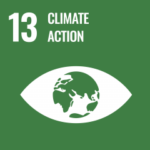
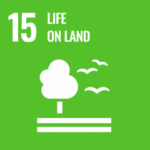
In support of our Forest Project, a long-standing project with a system-level approach, we have helped launch Nature Action 100 and serve on the Steering Group. This quarter we were excited to have the first round of meetings with companies as part of this multi-year collaboration. We participated on engagement teams that focus on the pharmaceutical industry to engage with Merck and AbbVie, and consumer goods and food industry, to engage with Grupo Bimbo, Sysco, Costco, and General Mills. In our dialogues, we explained the importance of company action to help halt and reverse nature loss by 2030.
Nature Action 100 has six key expectations, which are: ambition; assessment; nature target setting; rights-based implementation; governance; and engagement. Each conversation reflects where a company is exposed to nature risks and opportunities and their unique relationship with nature. For example, this varies based on whether they operate in key biodiversity areas, face water stress or cause air and water pollution, or source raw materials that contribute to land use change or deforestation.
Investment Highlight: Domini Impact International Equity Fund and Domini International Opportunities Fund
Carrefour, a French hypermarket, has designed commodity-specific projects to help avoid deforestation throughout its supply chain. To do so, it has classified certain products, such as soy, beef, cotton, and palm oil, as sensitive and subject to particular attention. For example, the company committed to reducing 50% of its beef purchases originating from critical deforestation areas by 2026 and completely halting these purchases by 2030. Its key branded products will also use deforestation-free soy for animal feed by 2025. Moreover, the firm’s CEO, Alexandre Bompard, is the co-director of The Forest Coalition, a platform of 200 companies dedicated to fighting deforestation.
Addressing Climate Risk and Racial Equity in Farm and Agriculture Financing

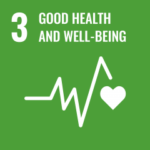

Agriculture is one of the most important areas to address related to biodiversity and climate change, and it also plays an important role in economic development and providing access to healthy, affordable food. We recently engaged with bond issuer, Federal Farm Credit Banks Funding Corporation (Farm Credit System), the biggest lender to U.S. agriculture, supporting 45.9% of U.S. farm debt. We reached out to understand how Farm Credit System is both evaluating and addressing its exposure to short and long-term climate related risks, but also discussed how they proactively support resilience at the systems level through advancing climate-smart agriculture, preserving biodiversity, and supporting farmer livelihoods and well-being.
This type of institution has an important role in providing access to capital that can unlock economic opportunity. In addition to what it funds, it is also important to look at who Farm Credit System is lending to, and that it takes racial equity into consideration. A focus on addressing historical inequities in lending can provide a business opportunity while also helping improve the racial wealth gap. In a recent dialogue, we asked about how they evaluate racial demographic information among farmers to whom it provides loans and if they have strategies in place to promote diversity in its in lending activity.
Investment Highlight: Domini Impact Bond Fund
Federal Farm Credit Banks Funding Corporation’s (Farm Credit System) driving mission is to provide funding to rural communities to support the U.S. agricultural system. The deployed funds enable borrowers to care for the land and grow their businesses. Some of Farm Credit System’s customers are adopting climate-smart agricultural practices that help strengthen the national food system.
Domini Impact Bond Fund Theme Allocations*
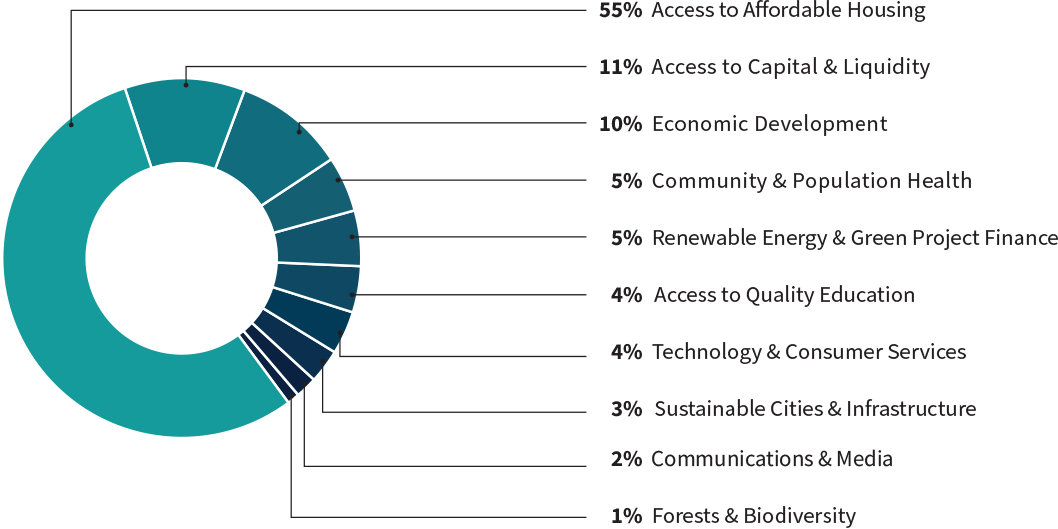
* Based on portfolio holdings as of 6/30/2024, excluding cash & cash equivalents, cash offsets, futures, swaps and options with the exception of short-term U.S. Agency bonds and Certificates of Deposit, which are reflected in this reporting. Numbers may not sum to totals due to rounding. The composition of the Fund’s portfolio is subject to change. Visit domini.com to view the most current list of the Fund’s holdings.
The Rise in Child Labor in the U.S. and Company Responsibility
By Lionella Pezza, Director of Impact Research

Since 2021, more than 250,000 unaccompanied children have crossed the U.S. southern border. Many are facing economic pressures to seek employment. Thousands of these unaccompanied minors have sadly ended up working in illegal and dangerous jobs in the supply chains of large American companies, mostly in the food and manufacturing industries, some even operating heavy machinery, or working night shifts, often leaving them too tired to go to school during the day. Children are much more likely than adults to get injured on the job, especially when handling machinery. Many private auditors, whose job is to ensure compliance with labor law in factories, have failed to identify children for several reasons, including because audits are announced rather than unannounced, infrequent night shift audits, and use of fraudulent identification documents to secure a job.
In 2024, several large U.S. companies have started to take concrete steps to address the issue, as discussed on page 4 of this issue. These actions include hiring night-shift workers directly, increasing audits for night shifts, and strengthening suppliers’ code of conduct. The jobs that children were working often have less desirable wages or working conditions, making them a higher risk for child labor exploitation. Companies can help address this by maintaining policies and practices to protect fundamental labor rights, including freedom of association and collective bargaining, non-discrimination, worker health and safety, and encourage participation in worker-driven social responsibility initiatives.
In early 2024, Amazon convened companies, including Disney and PepsiCo to discuss how to work towards eliminating illegal child labor. Twelve companies, including General Mills, Mondelez, and Unilever, hired a nonprofit, Verité, to promote responsible labor practices and to retrain 600 American suppliers and staffing agencies and to assist employed children. To prioritize and identify areas of greatest risk, Verité carried out a geographic risk analysis to map the absolute number of unaccompanied children by state and county, per capita, and where there was overlap of this presence with major centers of industries and high employment demand. This risk modeling allows companies to determine how to prioritize next steps and avoid child exploitation. For example, when children are found in supply chains, they should be supported and provided with some kind of a remedy, not simply fired.
The work Verité is doing is essential in helping companies identify possible risk areas, but companies need to establish their own supply chain mapping, an up-to-date code of conduct for suppliers, and a robust, sophisticated auditing system to understand the local context.
Through the years, as part of its research process, Domini has developed a system to analyze how companies manage their supply chains. We seek to invest in companies that publish a list of their suppliers, have an auditing system where visits are unannounced and conducted by an unassociated third party (not by the company itself) or participate in worker-driven social responsibility initiatives. We also seek companies that disclose the percentage of suppliers audited year on year, the findings of their audits, and their remediation practices once an abuse is identified.
We know that a definitive solution to child labor and exploitation will have to come from a collective effort. Governments, companies, non-for-profit organizations, and investors all have a role to play. We welcome the actions of some of our portfolio companies to step up and take collective action to tackle such a troubling systemic problem. We will continue to do our part.
Domini News
At Domini, we seek to harness the power of finance to create a better world. From innovative approaches to the role of investors in addressing nature and biodiversity loss, we cover a range of topics that highlight the intersection of finance and environmental stewardship.
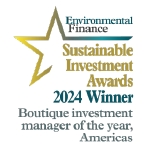
Domini Awarded ‘Best Boutique Investment Manager of the Year – Americas’
We are proud to announce that we have received the ‘Best Boutique Investment Manager of the Year – Americas, Environmental Finance Sustainable 2024 Award. This recognition, which celebrates the work of impact investors and promotes best practices across all asset classes and geographies, is a testament to Domini’s unwavering dedication to helping make a positive impact on people and planet for the last 30 years. Read the interview with our CEO, Carole Laible at domini.com/EF2024

Engagement by the Numbers – Domini Publishes its Annual Engagement Report
Utilizing our role as shareholders, we encouraged stronger policies and practices to advance our twin goals of Ecological Sustainability and Universal Human Dignity throughout 2023. To share with our investors how we leveraged our voice for impact, we released our 2023 Annual Engagement report, which provides a quantitative review of our engagement work across our Funds. Read the report at domini.com/2023-annual-engagement-report/

Update: Dollar General Issues Worker Health & Safety Report
After our majority vote on the 2023 shareholder proposal at Dollar General requesting an independent third-party audit on worker health and safety, we appreciate that the company carried out the audit and published a report on it. We previously engaged to learn about the board oversight of the process and stakeholder outreach, as we felt that worker input was essential for a credible and effective audit.
Since reviewing the public report, we recently wrote to share our analysis and additional questions with the company. While we welcome the final report, we noted that very limited information was included in the audit on the importance of worker input or if workers were provided safe and effective channels to participate, free from risks of retaliation or discrimination for speaking freely about working conditions. For example, 12 or only 0.06% of the company’s 20,000 stores were visited for the audit, and this doesn’t present a representative view of the company’s vast work environment.
We hope they will now implement the findings and recommendations to create a safer work environment, increase worker satisfaction, and reduce turnover.
